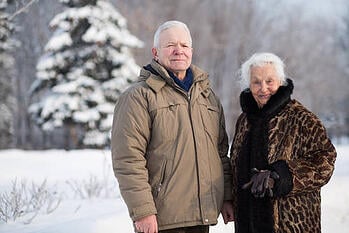 While many people dread the arrival of cold weather, winter's freezing temperatures pose particular health hazards to seniors.
While many people dread the arrival of cold weather, winter's freezing temperatures pose particular health hazards to seniors.
Read on for some tips to help prepare your aging loved one for the months ahead.
Preparation Matters
The best way to help seniors weather the weather is through adequate preparations. Power outages and loss of services -- including heat, water and phone – can be a fact of life during the winter months. Make sure your loved one has everything he/she needs to securely endure a storm. Stock up on food, bottled water and medication, as well as critical supplies, such as flashlights, batteries, lanterns, spare blankets, and a battery-operated radio.
A Chill In the Air
Older adults are at an increased risk for hypothermia because of a naturally diminished reaction to cold. Help your aging loved one stay warm by setting his/her home thermostat to 68-75 degrees. Lightweight layered clothing, such as fleece and other synthetic blends, are suitable for indoors, while hats, gloves, and scarves – which help retain body heat – are outdoor essentials.
Because skin thins with age, older Americans are more susceptible to dryness. Use a humidifier to keep room air moist, and encourage your loved one to drink plenty of water. (Even in the winter months, dehydration can still be a real problem for older seniors, resulting in urinary tract infections and other complications.) Ward off dry skin with moisturizing lotions and creams and use a nasal lubricant to keep the lining of the nose damp.
Slippery Conditions
Approximately 1.6 million older Americans end up in the emergency room each year due to injuries from falls. Snow and ice slips are major culprits. Encourage seniors to stay inside when conditions are poor. When your loved one does venture out, sensible shoes are critical. Ensure that all sidewalks are cleared and sprinkled with salt or sand. Assistive devices, from hand rails to walkers, should be used to help enhance balance. Encourage your loved one to stretch daily to promote healthy circulation and keeps muscles limber. Lastly, if your loved one insists on spending time outdoors, be sure to watch for signs of hypothermia, including shallow breathing, slurred speech, dizziness, confusion, unusual behavior, and an irregular heartbeat.
Low Temperatures, Low Spirits
Depression commonly affects older adults but can be exacerbated when inclement weather restricts social opportunities. Factor in a decrease in sunlight hours, and isolation becomes an even more devastating threat. Help your loved one stay engaged in social activities. If face-to-face contact isn’t possible, a simple phone call can keep loneliness at bay.
A Trial Stay?
With all the challenges of the winter season, why not consider a trial stay at a senior living community? A short-term stay not only offers your loved one maintenance-free living during the cold and snow, but also provides you, the caregiver, with much-needed peace of mind. A senior living community provides plenty of social interaction for your loved one and can help them stay engaged in life during what can be a very lonely time for those that live alone at home. Instead of worrying about how your loved one is faring during a snowstorm, wouldn’t it be comforting to know that he/she is safe, well-cared for, and surrounded by warm, welcoming friends?
Key Takeaways
- Keep your aging loved one’s physical and mental health in mind when planning for cold weather.
- Prevent dry skin through moisturizing methods, including humidifiers, fluids, and lotions.
- Minimize the risks of fall-related injuries by clearing outdoor walkways and encouraging your loved one to stay inside when conditions are poor.
- Safeguard your loved one’s mental health by arranging for frequent social opportunities.
- Explore the option of a trial stay at a senior living community during the cold winter months.

